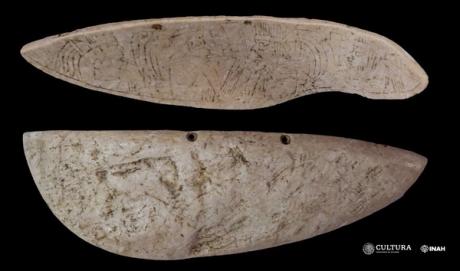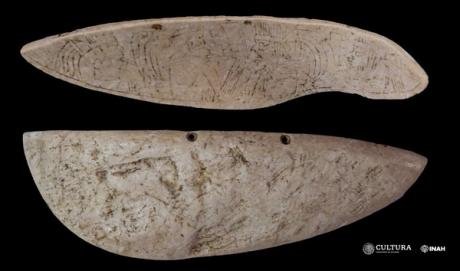
A finely decorated choker necklace made from a conch shell has been discovered by staff of Mexico’s National Institute for Anthropology and History (INAH) near Nicolás Bravo, a town in the state of Quintana Roo.
The artefact was unearthed during archaeological excavations related to construction of the controversial Maya Train project, the first legs of which are due to become operational later this year on the Yucatán Peninsula. According to researchers, the choker dates back to the Terminal Classic period of the ancient Maya empire, an era defined by the Mesoamerican society’s mysterious collapse between the 7th and 9th centuries.
The delicate choker, which sports sgraffito designs of figures wearing headbands in profile, is 9.6 cm long, 3.5 cm wide and only a millimeter thick. Maricela Salazar Carrillo, the scientist leading the excavation, found the accessory in a fill, a ditch or pit that is typically dated later than the object itself, under nearly a foot of sediment. The images carved into the choker evoke scenes of pre-Hispanic diplomacy, featuring elite Mayans in conversation.
“There are few similar specimens that have been recovered or that are known,” Salazar Carrillo said in a statement. The piece will remain in INAH’s care for further study and potential inclusion in future exhibitions, due to its quality.
This is far from the first major archaeological discovery made in Mexico this year. In August, a Mayan nose ornament was discovered in Chiapas, the modern-day location of the ancient city of Palenque. In June, a pre-Columbian statue of a young woman was found in the Veracruz region.
The first sections of the Maya Train project, a $9.8bn, 1,500km rail line that will connect major Mayan archaeological sites on the Yucatán Peninsula, are expected to begin operation in December. Activists have raised concerns about the ecological and archaeological damage the train’s construction may be causing.









